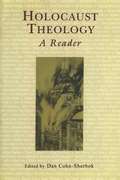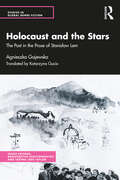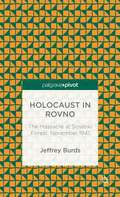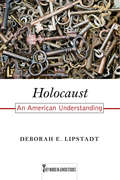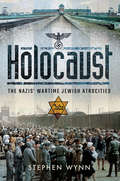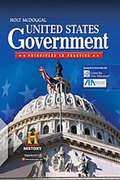- Table View
- List View
Holocaust Theology: A Reader
by Dan Cohn-SherbokWhere was God during the Holocaust? And where has God been since? How has our religious belief been changed by the Shoah? For more than half a century, these questions have haunted both Jewish and Christian theologians. Holocaust Theology provides a panoramic survey of the writings of more than one hundred leading Jewish and Christian thinkers on these profound theological problems. Beginning with a general introduction to Holocaust theology and the religious challenge of the Holocaust, this sweeping collection brings together in one volume a coherent overview of the key theologies which have shaped responses to the Holocaust over the last several decades, including those addressing perplexing questions regarding Christian responsibility and culpability during the Nazi era. Each reading is preceded by a brief introduction. The volume will be invaluable to Rabbis and the clergy, students, scholars of the Holocaust and of religion.
Holocaust and Conceptions of German: The Elephant in the Room (Holocaust Education – Historisches Lernen – Menschenrechtsbildung)
by Marc-Philip Hermann-CohenThe Holocaust is inseparable from the Israeli identities even seven decades following the atrocities during World War II, Israeli daily life is shaped by the horrible crimes committed by the Nazis. This book conceptualizes the intricacies of the Israeli identity in relation to learning German as a foreign language (GFL) in Israel throughout the course of history and the changing conception of Germany. This book includes an analysis of a selection of twenty-five GFL language books which reflect the stigmatization and tabooization of the Holocaust and also the qualitative analysis of a subject pool of 105 learners of GFL. The author finds that identities are co-constituted by four individualized Thought Styles, a concept borrowed from Ludwik Fleck. Thought Styles capture the individual perspective of the language learner’s view of Germany and are categorized in this thesis as German Engineering, Cold Germany, Neo-Nazi Germany, and The Other Germany. The research draws from discourse theory, critical psychology, and the oft-overlooked classical theory of Ludwik Fleck. Although the relationship between Germany and Israel has been amicable for the last six decades, the choice for Israelis to learn the language that was used by a nation that once attempted to eradicate the Jewish people is emotive and infinitely complex.
Holocaust and the Stars: The Past in the Prose of Stanisław Lem (Studies in Global Genre Fiction)
by Agnieszka GajewskaThis book is a groundbreaking study of one of the greatest science fiction writers, the Polish master Stanisław Lem. It offers a new direction in research on his oeuvre and corrects several errors commonly appearing in his biographies. The author painstakingly recreates the context of Lem’s early life and his traumatic experiences during the Second World War due to his Jewish background, and then traces these through original and brilliant readings of his fiction and non-fiction. She considers language, worldbuilding, themes, motifs and characterization as well as many buried allusions to the Holocaust in Lem’s published and archival work, and uses these fragments to capture a different side of Lem than previously known. The book discusses various issues concerning the writer’s life, such as his upbringing in a Jewish, Zionist-minded family, the extensive relations between the Lem family and the elite of Lviv at that time, details of the Lem family killed during the German occupation and attempts to reconstruct what happened to Lem’s parents and to the writer himself after escaping the ghetto. Part of the Studies in Global Genre Fiction series, this English translation of the Polish original, which has already been considered a milestone in Lem studies, offers a fresh perspective on the writer and his work. It will be an important intervention for scholars and researchers of Jewish studies, Holocaust literature, science fiction studies, English literature, world war studies, minority studies, popular culture, history and cultural studies.
Holocaust in Rovno: The Massacre at Sosenki Forest, November 1941
by Jeffrey BurdsIn November 1941, near the city of Rovno, Ukraine, German death squads murdered over 23,000 Jews in what has been described as the second Babi Yar. This meticulous and methodologically innovative study reconstructs the events at Rovno, and in the process exemplifies efforts to form a genuinely transnational history of the Holocaust.
Holocaust!: The Shocking Story of the Boston Cocoanut Grove Fire
by Paul BenzaquinFirst published in November 1959, this is the bestselling account of the fire at The Cocoanut Grove, a premier nightclub during the post-Prohibition 1930s and 1940s in Boston, Massachusetts, on the night of November 28, 1942.It was the scene of the deadliest nightclub fire in history, killing 492 people and injuring hundreds more. The scale of the tragedy shocked the nation and briefly replaced the events of World War II in newspaper headlines. It led to a reform of safety standards and codes across the U.S., and to major changes in the treatment and rehabilitation of burn victims internationally.Written by radio broadcaster and Boston Globe journalist, Paul Benzaquin, this book is widely regarded as one of the most harrowing tales in the annals of disaster: a story of panic and desperation, of chaos and utter fear, it is also a story of almost incredible courage and ingenuity in the midst of despair.What gives this story lasting value is its emphasis on the aftermath of the fire: the medical innovations wrought by hospital workers in their attempt to save lives; the change in safety regulations brought about by the official enquiry in to the causes of the fire.Paul Benzaquin has scrupulously sifted facts from fancy and with powerful dramatic force molded these and other important elements into a stunning narrative, making Holocaust! a powerful book.Unmissable reading.Contains a detailed layout plan of The Cocanut Grove illustrated with over 20 black-and-white photographs.
Holocaust: An American Understanding
by Deborah E. LipstadtImmediately after World War II, there was little discussion of the Holocaust, but today the word has grown into a potent political and moral symbol, recognized by all. In Holocaust: An American Understanding, renowned historian Deborah E. Lipstadt explores this striking evolution in Holocaust consciousness, revealing how a broad array of Americans--from students in middle schools to presidents of the United States--tried to make sense of this inexplicable disaster, and how they came to use the Holocaust as a lens to interpret their own history. Lipstadt weaves a powerful narrative that touches on events as varied as the civil rights movement, Vietnam, Stonewall, and the women's movement, as well as controversies over Bitburg, the Rwandan genocide, and the bombing of Kosovo. Drawing upon extensive research on politics, popular culture, student protests, religious debates and various strains of Zionist ideologies, Lipstadt traces how the Holocaust became integral to the fabric of American life. Even popular culture, including such films as Dr. Strangelove and such books as John Hershey's The Wall, was influenced by and in turn influenced thinking about the Holocaust. Equally important, the book shows how Americans used the Holocaust to make sense of what was happening in the United States. Many Americans saw the civil rights movement in light of Nazi oppression, for example, while others feared that American soldiers in Vietnam were destroying a people identified by the government as the enemy. Lipstadt demonstrates that the Holocaust became not just a tragedy to be understood but also a tool for interpreting America and its place in the world. Ultimately Holocaust: An American Understanding tells us as much about America in the years since the end of World War II as it does about the Holocaust itself.
Holocaust: The Nazis' Wartime Jewish Atrocities
by Stephen Wynn“Trace[s] the developing Holocaust from the Odessa Massacre . . . a very good point to start into understanding this terrible genocide.” —FiretrenchIn Holocaust, Stephen Wynn looks at the build up to the Second World War, from the time of Hitler’s appointment as Chancellor of Germany in January 1933, as the Nazi Party rose to power in a country that was still struggling to recover politically, socially and financially from the aftermath of the First World War, while at the same time, through the enactment of a number of laws, making life extremely difficult for German Jews. Some saw the dangers ahead for Jews in Germany and did their best to get out, some managed to do so, but millions more did not. The book then moves on to look at a wartime Nazi Germany and how the dislike of the Jews had gone from painting the star of David on shop windows, to their mass murder in the thousands of concentration camps that were scattered throughout Germany. As well as the camps, it looks at some of those who were culpable for the atrocities that were carried out in the name of Nazism. Not all those who were murdered lost their lives in concentration camps. Some were killed in massacres, some in ghettos and some by the feared and hated Einsatzgruppen.“Historical studies like Holocaust: The Nazis’ Wartime Jewish Atrocities are increasingly necessary to remind present and future generations of what can happen when the forces of bigotry and racially motivated hatred goes unchecked in even the most civilized of nations.” —Midwest Book Review
Holstun Pamphlet Wars: Prose in the English Revolution
by James HolstunThe English Revolution of 1642-60 produced an explosion of stylistically and ideologically diverse pamphlet literature. The essays collected here focus on the prose of this new revolutionary era, and the new public sphere it helped to create. They cover a wide range of topics including the Royalist attack on the Sectarian Babel and the street theatre of the Ranters.
Holt American Anthem
by Edward L. Ayers Robert D. Schulzinger Jesús F. de la TejaNIMAC-sourced textbook
Holt American Anthem New York
by Edward L. Ayers Robert D. Schulzinger Jesús F. de la Teja Deborah Gray WhiteHolt American Anthem New York
Holt American Anthem: Reconstruction to the Present
by Edward L. Ayers Robert D. Schulzinger Jesús F. de la Teja Deborah Gray WhiteNIMAC-sourced textbook
Holt American Anthem: Reconstruction to the Present
by Edward L. Ayers Robert D. Schulzinger Deborah Gray White Jesus F. de la TejaAmerican Anthem was created to make your study of American history an enjoyable, meaningful experience. The contents of the book include: The Union in Crisis (1850-1877), An Industrial Nation (1860-1920), Becoming a World Power (1898-1920), A Modern Nation (1919-1940), A Champion of Democracy (1939-1960), A Nation Facing Challenges (1954-1975), Looking Toward the Future (1968-Present), Issues in Contemporary American Society: Document-Based Investigations, etc.
Holt American Government
by Steven KelmanHolt American Government examines the way in which government in the United States is organized and the impact that many aspects of government have on the lives of citizens. From this study of government emerges a series of themes: Political Foundations, Principles of Democracy, Constitutional Government, Political Processes, World Affairs, Citizenship, and Public Good. These themes provide a basis for defining and analyzing the U.S. political system and its effectiveness in fulfilling the needs of the public.
Holt California Social Studies: United States History, Independence to 1914
by William Deverell Deborah Gray WhiteThis textbook of Holt California Social Studies covers United States history from Independence to 1914 for students of Grade 6-8.
Holt California Social Studies: World History, Ancient Civilizations
by Richard Shek Stanley M. BursteinThis edition contains topics on Early Humans and Societies, Mesopotamia, Egypt and Kush, Civilization in India and China, Foundations of western ideas, The Roman World, Endings and Beginnings and Biographies of persons who have influenced history. Charts, Graphics, and Time Lines are some of the additional features of this book.
Holt Call to Freedom
by Sterling Stuckey Linda Kerrigan SalvucciThe book talks about broad themes central to American history like Geographic Diversity, Economic Development, Cultural Diversity, technology and society that will help the readers understand the connections between historical events and see how past events relate to the social, political, and economic challenges that America as a nation faces today.
Holt McDougal Civics in Practice Florida Guided Reading Workbook
by Holt McdougalHolt McDougal Civics in Practice Florida: Guided Reading Workbook Integrated: Civics, Economics, and
Holt McDougal Middle School World History
by Richard Shek Stanley M. BursteinStudying history will be easy for you using this textbook.
Holt McDougal United States Government: Principles in Practice (Ohio Edition)
by Holt Mcdougal StaffThis book makes your study of U.S. government an enjoyable, meaningful experience. It helps you understand how our nation, through both its leaders and its people, has accepted the responsibilities of leadership-from the founding of the nation to the present day. By focusing your study of American government on these responsibilities, this book ensures students are able to accept the responsibilities required of all citizens and residents who are effectively engaged in American politics today.
Holt McDougal United States History: Beginnings to 1877, Guided Reading Workbook
by Holt McdougalThe Guided Reading Workbook helps increase comprehension, builds vocabulary, offers guided-reading support.
Holt McDougal United States History: Civil War to the Present
by William Deverell Deborah Gray WhiteStudying U.S. history will be easy for you using this textbook.
Holt McDougal World History: Ancient Civilizations Through the Renaissance
by Richard Shek Stanley M. BursteinLearn more about world history, from the earliest humans through the scholars and politicians of the European Renaissance.
